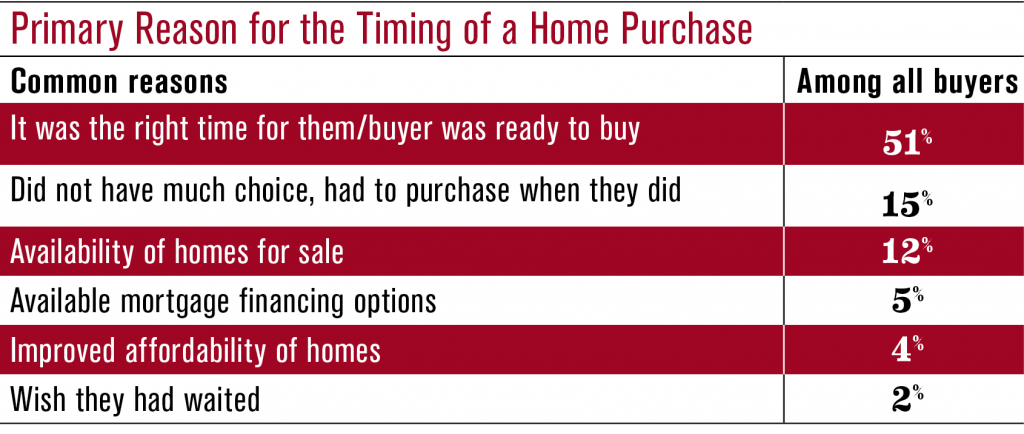You may receive leads from buyers who just aren’t quite ready to make a deal—but with patience, you can convert them into sales
By Regina Ludes
Some homebuyers can make snappy decisions, while others are slow to make an offer—even when the perfect home is right in front of them.
Jeremy Caleb Johnson, CRS, recalls working with a couple who had difficulty making a decision on a home purchase because they had something specific in mind. “They were empty nesters who were downsizing from an 1,800-square-foot home to a smaller property near the water,” he recalls. “Whenever I found a property that I thought they would like, they made excuses why it wasn’t right.”
 He finally showed the couple a house that seemed perfect. “What prompted them to pull the trigger on this property was that there was a deeded boat slip across the street,” Johnson says. When the deal finally closed—nearly five years after they began their search—the couple told Johnson, “It isn’t perfect, but it’s the right home for us right now.”
He finally showed the couple a house that seemed perfect. “What prompted them to pull the trigger on this property was that there was a deeded boat slip across the street,” Johnson says. When the deal finally closed—nearly five years after they began their search—the couple told Johnson, “It isn’t perfect, but it’s the right home for us right now.”
Hesitant buyers present a unique challenge to today’s real estate professionals, especially in hot sellers’ markets. These buyers may show interest at the start, but when it comes time to make a serious offer, they make assorted excuses for not buying, from not getting involved in a bidding war to a fear of moving to an unfamiliar location. It’s a life-changing decision that can paralyze some buyers into indecision, sometimes indefinitely. By practicing patience, understanding buyers’ motivations and providing sound advice, agents can ease buyers’ fears and convert them into satisfied homeowners.
Determine buyers’ readiness
According to the National Association of REALTORS®, 51% of all homebuyers purchased their home because the timing was right to move. Only 2% said they wished they had waited to buy.
Determining a buyer’s readiness can be tricky business. Before showing a single home, agents need to sit down with buyers, educate them about the current housing market and discover their motivation for buying, says Monica Neubauer, CRS, with Benchmark Realty in Franklin, Tennessee, and RRC instructor who teaches “Effective Buyer Sales Strategies.” This consultative approach can help agents recognize signs of hesitancy before the search process begins.
“Agents need to get a full picture of what buyers are looking for. They may realize that some hesitant buyers aren’t ready to buy,” says Neubauer.
Further, some buyers may not articulate their concerns, so it’s up to agents to recognize non-verbal cues. Neubauer says hesitant buyers may avoid answering your questions, make excuses or delay decisions indefinitely. Johnson notices a closing off of their body language, crossing of arms and a lack of emotion in the buyer’s demeanor. That’s when he asks some questions, like “How do you feel about this house?” or “What are you thinking?”
“Sometimes, they don’t know the answer,” Johnson says. “Sometimes, it’s about the warm, fuzzy feeling they expect to get when they’ve found the right home, and they’re not getting it.”
Sometimes, agents need to give clients a nudge. If, after losing out on several offers, buyers are still waffling on making another offer, Neubauer suggests asking a simple question to determine how serious they are: Do you want to make an offer, or do you want to buy a house? “If they’ve made five offers that haven’t been accepted, and they’re not willing to make a more serious offer, it might be time to let them go,” Neubauer says.

Advice for agents
As some buyers contemplate their purchase decision, agents must be patient and lend support when they need it. “You can’t push buyers into a decision before they’re ready. You can’t want to make that purchase more than they do,” Marcus says. Agents should keep an eye on the long term. “They may not buy now, but they might in the future,” Marcus adds.
Johnson concurs. “Staying focused on the buyer’s needs and goals will drive the search process. Remind them of their end goal, dangle it like a carrot stick. Sooner or later, they’ll find their own motivation and move themselves off the fence,” he says.
Counter Fears with Facts
Several common issues can stop buyers in their tracks, such as not wanting to get involved in bidding wars, being too comfortable in their current home and fear of moving to a new location. By focusing on facts, agents can ease buyers’ concerns.
Fear of competition
In markets characterized by low inventory, high demand and bidding wars, many buyers decide to back off from the competition. This is especially true of younger buyers who may not have the financial wherewithal to outbid someone else.
“People find the process discouraging, especially first-time buyers,” says Michael Marcus, CRS, broker-associate with Coldwell Banker in Denver, Colorado. “After losing out on several bidding wars, some decide to continue renting, hoping that the heated market will slow down.”
To counter this concern, Marcus educates young clients on market realities. He explains that the market may not change much a year from now. Properties may be 20% higher then, historically-low mortgage rates may rise and there may still be low inventory.
Even with his explanation, first-time shoppers may still decide to continue to rent, delaying the purchase decision further. It can take another year before these buyers decide to search again. So in the meantime, Marcus signs them up to receive MLS alerts and contacts them monthly until they feel ready to buy. By then, they’ve learned more about the housing market and feel more confident about bidding against other buyers, Marcus says.
Too comfortable where they live now
Existing homeowners looking to downsize or upsize may also experience hesitancy. They may want to move, but may not have a strong incentive to move right now. Since they’re already established in their home, they can take their time looking until they find something that meets their criteria, and that process can take up to a year—or longer.
Just as he does for first-time buyers, Marcus keeps these clients in the pipeline by setting up MLS alerts, which inform prospects about properties that have come on the market. Marcus receives the alerts, too, and follows up with buyers to see if they want to visit the property, which they usually do.
The follow-up process may seem tedious, Marcus says, but his patience is usually rewarded. “There’s no hurrying these buyers or pushing them to make a decision. You have to wait for them to want the home before they’ll pull the trigger,” Marcus says.
Fear of moving to an unfamiliar location
While Virginia Beach is a destination and military market with 450,000 residents, Johnson says many people outside the growing city aren’t familiar with all it has to offer. He adds that some buyers feel overwhelmed by the prospect of moving to the area, which contributes to their hesitancy. Adding to their confusion is the advice they get from friends and colleagues about where to live in Virginia Beach, some of which isn’t practical.
To counter these concerns, Johnson coaches out-of-town buyers about the different neighborhoods, explains the characteristics and culture of each community along with the amenities they expect to find. “Whether it’s about economics, the school district or safety concerns, I’ll find the right resources, check school websites or contact the local police to get them the information they need to make an informed decision,” says Johnson.
For a deeper dive, check out the numerous webinars geared toward homebuyer strategies on CRS.com/webinars.
Photo: iStock.com/anopdesignstock/Mironov Konstantin








